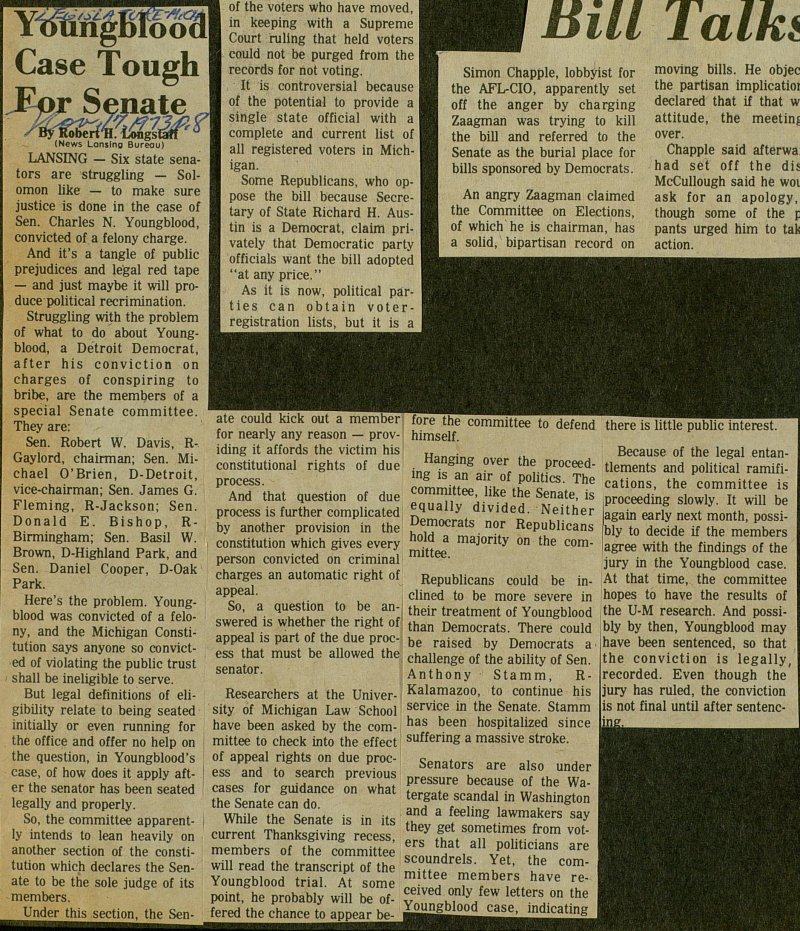Youngblood Case Tough For Senate

LANSING - Six state senators are struggling - Solomon like - to make sure justice is done in the case of Sen. Charles N. Youngblood, convicted of a felony charge. And it's a tangle of public prejudices and legal red tape - and just maybe it will produce political recrimination. Struggling with the problem of what to do about Youngblood, a Detroit Democrat, after his conviction on charges of conspiring to bribe, are the members of a special Senate committee. They are: Sen. Robert W. Davis, R-. Gaylord, chairman; Sen. Michael O'Brien, D-Detroit, vice-chairman; Sen. James G. Fleming, R-Jackson; Sen. Donald E. Bishop, RBirmingham; Sen. Basil W. Brown, D-Highland Park, and Sen. Daniel Cooper, D-Oak Park. Here's the problem. Youngblood was convicted of a felony, and the Michigan Constitution says anyone so convicted of violating the public trust shall be ineligible to serve. But legal definitions of eligibility relate to being seated initially or even running for the office and offer no help on the question, in Youngblood's case, of how does it apply after the senator has been seated legally and properly. So, the committee apparently intends to lean heavily on another section of the constitution which declares the Senate to be the sole judge of its members. Under this section. the ate could kick out a member for nearly any reason - providing it affords the victim his constitutional rights of due process. And that question of due process is further complicated by another provisión in the constitution which gives every person convicted on criminal charges an automatic right of appeal. So, a question to be an-i swered is whether the right of! appeal is part of the due process that must be allowed the senator. Researchers at the University of Michigan Law School have been asked by the committee to check into the effect of appeal rights on due process and to search previous cases for guidance on what the Senate can do. While the Senate is in its current Thanksgiving recess, members of the committee will read the transcript of the Youngblood trial. At some point, he probably will be offered the chance to appear fore the committee to defend himself. Hanging over the proceeding is an air of politics. The committee, like the Senate, is equally divided. Neither Democrats nor Republicans hold a majority on the committee. Republicans could be inclined to be more severe in their treatment of Youngblood than Democrats. There could be raised by Democrats achallenge of the ability of Sen. Anthony Stamm, RKalamazoo, to continue his service in the Senate. Stamm has been hospitalized since suffering a massive stroke. Senators are also under pressure because of the Watergate scandal in Washington and a feeling lawmakers say they get sometimes from voters that all politicians are scoundrels. Yet, the committee members have received only few letters on the Youngblood case, indicating there is little public interest. Because of the legal entantlements and political ramifications, the committee is proceeding slowly. It will be again early next month, possibly to decide if the members agree with the findings of the jury in the Youngblood case. At that time, the committee hopes to have the results of jthe U-M research. And possibly by then, Youngblood may have been sentenced, so that the conviction is legally, recorded. Even though the jury has ruled, the conviction is not final until after sentencing.
Article
Subjects
Ann Arbor News
Old News